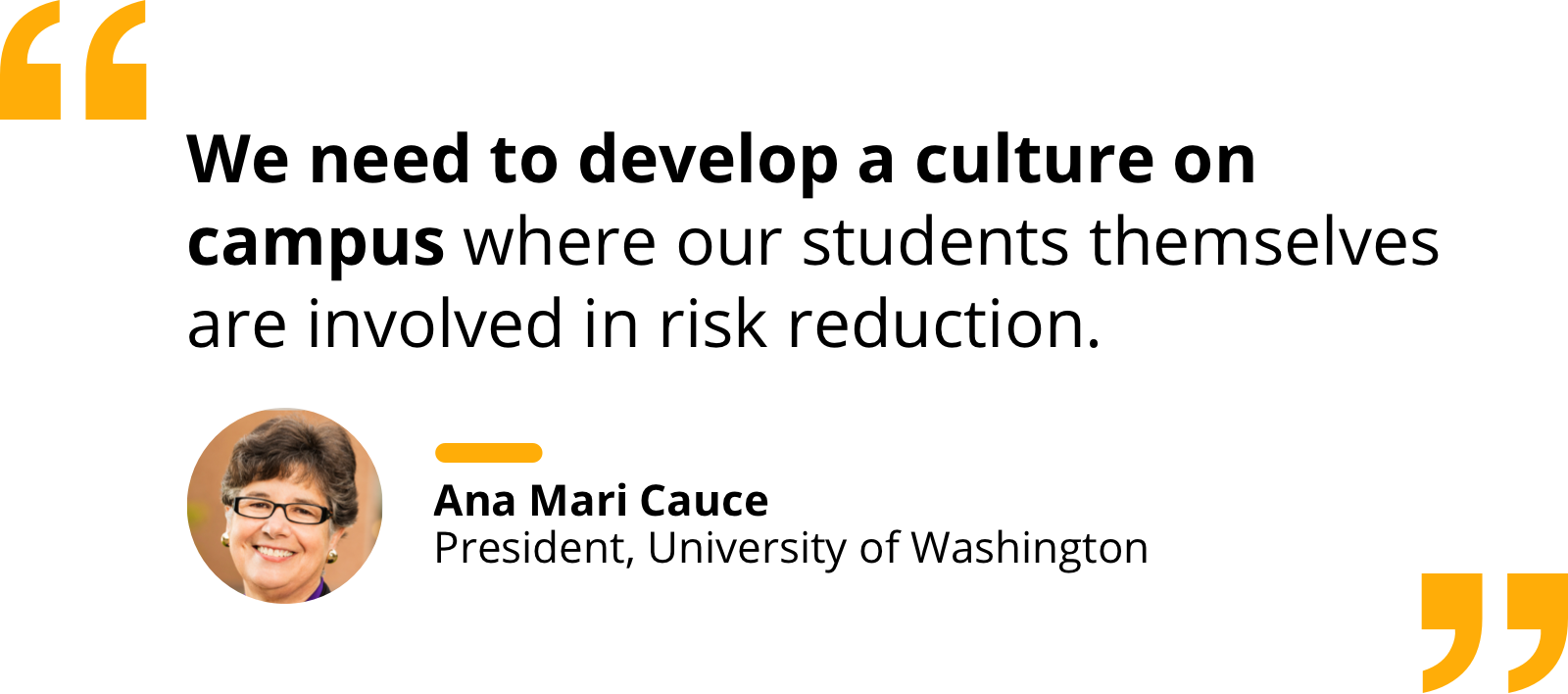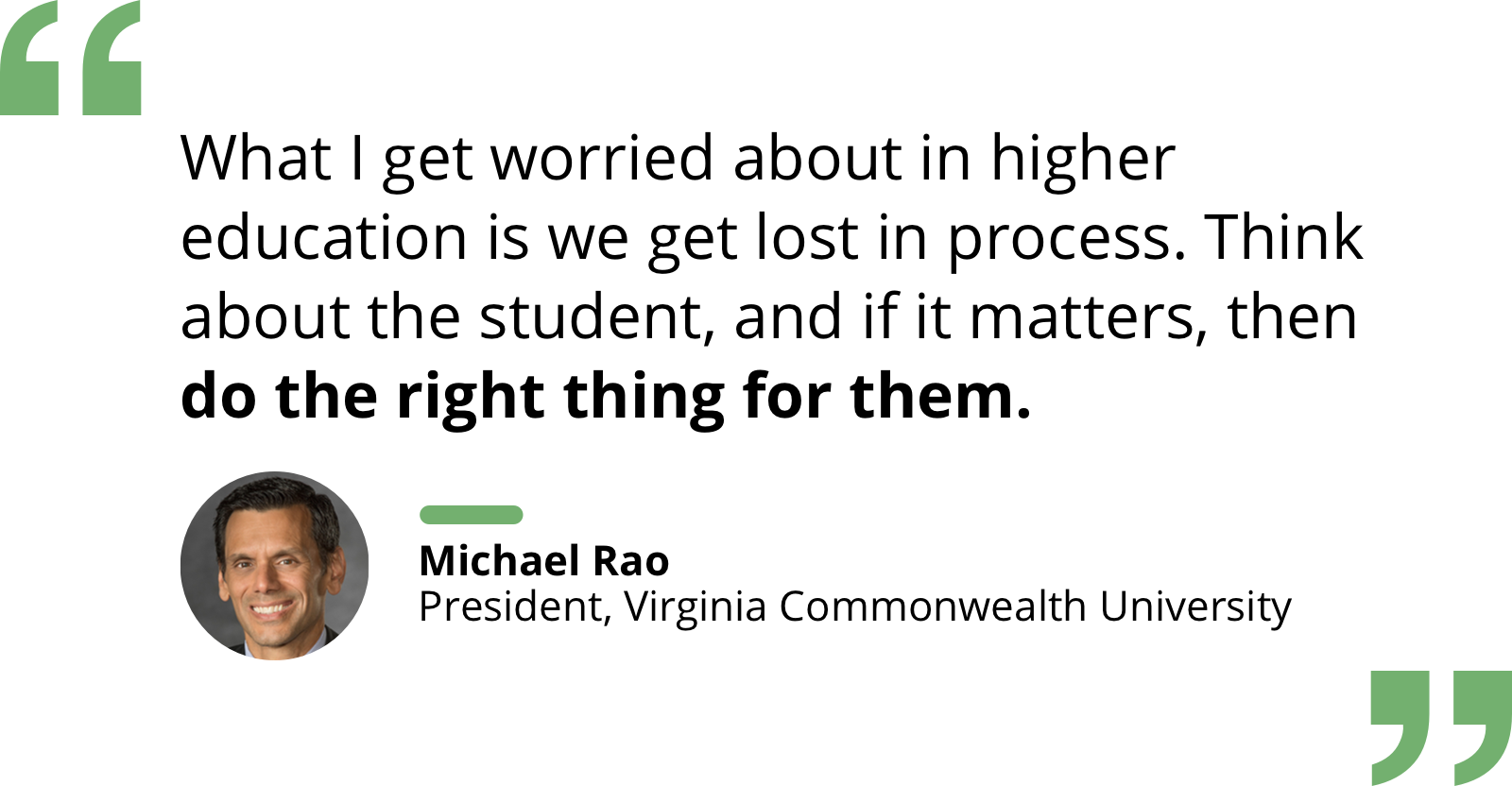With a new academic year fast approaching, higher education leaders have a lot on their plates. At the University Innovation Alliance (UIA), we know just how challenging new beginnings can be under normal circumstances – and during the past two-plus years, circumstances have been far from normal. We're always speaking with presidents, chancellors, and other higher ed leaders, and through the Innovating Together Podcast, we bring you those conversations. Following is another collection of leadership wisdom excerpted from the UIA's podcast, shared by people who have experienced and risen above some of the challenges that you might face this year.
COVID and Campus Safety
Everyone is tired of pandemic life, and far too many want to believe the threat of COVID is behind us. Sadly, the virus still poses health risks to our communities. From over two years of podcasts discussing institutional responses to COVID, here are just a few leader perspectives.
- "With the pandemic, people are going to the worst-case scenario all the time. You hear from a vocal minority who want you to eliminate every risk. You have to identify those risks, but then make the decisions to move forward where you can." (Becky Johnson, Interim President, Oregon State University)
- "Everyone deserves a safe option, which means that even if you're in a class with 30 students and you're the only student who doesn't want to go to back to face-to-face because you live with a family member who has health concerns, you deserve a safe option." (Kim Wilcox, Chancellor, University of California, Riverside)
- "We need to develop a culture on campus where our students themselves are involved in risk reduction." (Ana Mari Cauce, President, University of Washington)

The Human Factor
Computer pioneer Grace Hopper once said, "You manage things; you lead people." College and university leadership is a transactional job – leaders have to interact with the people they lead. Even if you already have great people skills, it's always helpful to learn about the best practices of other leaders.
- "If you listen to questions that come to you, they reveal what's important to the people. And then if you start to address what's important to people, people are going to take you seriously, regardless of if you're in a room with them, or if you're doing it virtually." (Frank Dooley, Chancellor, Purdue University Global)
- "I need everyone to be focused on each other’s needs, whether or not their needs rise to the top. For me, building mutual respect is the only way that I could possibly lead." (Gabrielle Starr, President, Pomona College)
- "Try and find pathways for people to advance and grow their responsibilities." (Samuel Stanley, President, Michigan State University)
- "Be OK with making the unpopular decision, with not being loved by everyone. I think the importance of being able to stand by those decisions is key. Leadership can be lonely, and so developing a network of peers that you can talk with as the challenges ebb and flow is key." (Maria Flynn, President and CEO, Jobs for the Future)
Learning How to Lead
We've spoken with leaders in many different places along their leadership journey. They've included people new to the position and still finding their way; and people serving as interim leaders until the institution hires a long-term replacement. Here's just a small sampling of the wisdom we've heard.
- "The best way of knowing whether this is the right job for you, and other people knowing you're the right person for the job, is to approach it not as if you’re running for the job, but to approach it as if you have the job." (Ana Mari Cauce, President, University of Washington)
- "It does take time to build up your own conception of leadership and find yourself in a complex organizational setting. It is far more important to set up the sense of direction and a sense of grounding on the use of values of an institution." (Ángel Cabrera, President, Georgia Institute of Technology)
- "Don’t come into a leadership situation like this one thinking that you’re going to have some grand, big vision. That’s not what the institution needs. We need to make sure that people are focusing on the direction that we were already going; and when I’m not interim and the new person comes in, that would be the time to think about new strategies, new visions." (Becky Johnson, Interim President, Oregon State University)
Be Ready for the Students
Ultimately, colleges and universities exist because of the people who come for the purpose of learning. Whether you interact daily or occasionally with the student body at your institution, serving them should always be among your highest priorities.
- "I think we should address and engage our students really early. We have so many talented students that are coming in now." (M. Brian Blake, President, Georgia State University)
- "I believe that our students are really eager to be at college. The experience is something that they value dramatically, and it means a lot to us to hear that." (Michael Drake, Former President, The Ohio State University)
- "We know that if we couldn’t meet students where they are, we had to change the paradigm from 'Are our students college-ready?' to 'Is our college student-ready?'" (Marcia Ballinger, President, Lorain County Community College)
- "Let's walk ourselves through a student's application process to our institution, and all of the communication, interfaces, and forms they get from us. Let's look for signs of welcome and inclusion. That climate is emotional, classroom, digital." (Kristen Renn, Professor of Higher Education and Associate Dean, Michigan State University)
- "We talk about pedagogy, yet there's an entirely different discipline, andragogy, that talks about educating adult learners. And the adult learner is wired a little bit different than the 18- to 24-year-old." (Frank Dooley, Chancellor, Purdue University Global)
- "What I get worried about in higher education, especially larger institutions, is we get lost in process. Think about the student, think about in my case the patient, and if it matters, then do the right thing for them." (Michael Rao, President, Virginia Commonwealth University)

Note: The interviews cited in this blog were drawn from the Weekly Wisdom and Scholarship to Practice Series originally aired between May 4, 2020 and May 2, 2022 as part of the University Innovation Alliance’s Innovating Together Podcast, created in partnership with Inside Higher Ed. We invite you to read Leadership Advice to Start the New Academic Year, the first blog in this series.

